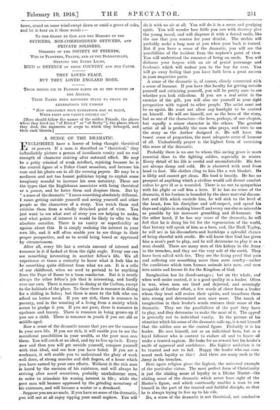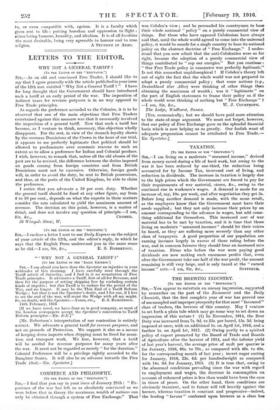A SENSE OF THE DRAMATIC. E NGLISHMEN have a horror of
being- thought theatrical or poseurs. If a man is described as "theatrical," they immediately picture a person of inordinate -vanity and no real strength of character striving after ,outward effect. He may be a petty criminal of weak intellect, rejoicing because he is the central figure of a Police ,Court sensation, and because his case and his photo are in all tire evening papers. He may be a mediocre and not too honest politician trying to exploit some imaginary scandal to increase his own notoriety. These are the types that the Englishman associates -with being theatrical or a poseur, and he hates them and despises them. But by " a sense of the dramatic " I mean something absolutely different. I mean getting outside yourself and seeing yourself and other people as the characters of a 'story. You watch them and criticize them from a wholly detached point .of view. You just want to see what sort of story you are helping to make, and what points of interest it would be likely to offer to the absolute outsider. There is no vanity or superficiality or egoism about this. It is simply realizing the interest in your own life, and it will often enable you to . see things in their proper perspective, and so to avoid being bored or oppressed
- by circumstances.
After all, every life has a certain amount of interest and romance in it if looked.at from the right angle. Every one can see something interesting in another fellow's life. We all experience at times a curiosity to know what it feels like to be something quite different from what we are. It is a relic of, our childhood, when we used to pretend to be anything from the Pope of Rome to a tram conductor. But it is nearly always the other fellow's job that is interesting, and hardly ever our own. There is romance in dining at the Carlton, except to the habitués of the place. To these there is romance in dining for .a shilling in Soho ; but there is none to the folk who can afford no better meal. If you are rich, there is romance in poverty, and in the wresting of a living from a society which seems to grudge it you. If you are poor, there is romance in opulence and luxury. There is romance in being grown-up if wou are a child. There is romance in youth if you are old or middle-aged.
Now a _sense of the dramatic means that you see the romance in your own life. If you are rich, it will enable you to see the animificent possibilities in your wealth, as the poor man sees them. You will catch at an ideal, and try to live up to it. Every now and then you will get outside yourself, compare yourself with that ideal, and see how you have failed. If you are a workman, it will enable you to understand the glory of work 'well done, of strong muscles and deft fingers,- of a home which you have earned by your own efforts. Without it the rich man is bored by the easiness -of his existence, and will always be striving after navel sensations, probably unwholesome ones, in order to stimulate his waning interest in life ; while the ,poor man will become oppressed by the grinding monotony of his existence, and will become a waster or a drunkard.
Suppose you are an uncle. If you have no sense of the drama.tio, you will not at all enjoy .tipping your small nephew. You will do it with no air at all. You will do it in a mean and grudging spirit. You will wonder how little you can with decency give the young rascal, and will dispense it with a forced smile, like the one that you reserve for your dentist. The urchin will probably make a long nose at you when your back is turned. But if you have a sense of the dramatic, you will see thd possibilities of the incident from 'the nephew's point of view. You will understand the romance- of 'being an uncle. You will disburse your largess with an air of genial patronage and bonhomie which will -endear you to the boy for ever. You will go away feeling that you have both been a great success in your respective parts.
A sense of the dramatic is, of course, closely connected with a sense of humour. If you have this faoulty for getting outside yourself and criticizing yourself, you will be pretty sure to see whether you look ridiculous. If you are a real artist in the exercise of the gift, you will also see yourself in your right perspective with regard to other people. The artist must not be an egoist. .He must not allow any limelight to be centred on himself. He will see himself, not as the hero of the story, but as one of the characters—the hero, perhaps, of one chapter, but equally a minor character in the others. The greatest artist of all is probably the man -who prays, and tries to see the story as the Author designed it. He will have the truest sense of proportion, the most adequate sense of humour of all. Undoubtedly prayer is the highest form of exercising this sense of the dramatic.
Probably there is no one to whom this saving grace is more essential than to the fighting soldier, especially in winter. Every detail'of his life, is sordid and uncomfortable. His feet are always damp and cold. He is plastered with mud from head -to foot. His clothes cling to him like a wet blanket. He is- filthy and cannot ,get dean. His food is beastly. He has no prospect .of anything which a civilian would call decent comfort unless he gets ill or is wounded. There is no one to sympathize with his plight or call him a hero. If he has no sense of the dramatic, if his horizon is bounded by the sheer material discom- fort and filth .which encircle him, he will sink to the level of the beast, lose his discipline and self-respect, and spend his days and nights in making himself and every one else as miserable as possible by his incessant grumbling and ill-humour. On the other .hand, if he has any sense of the dramatic, he will feel that he is doing his bit for the regeneration of the world. that history will speak of him as a hero, and, like Mark Tapley, he will see in his discomforts and hardships a splendid chance of:being cheerful with credit. He will know that God has given him a mari's part to play, and he will determine to play it as a man should. There are many men of this kidney in the Army in -the trenches, and they are the very salt of the earth. They have been salted with fire. They are the living proof that pain and suffering are something more than mere cruelty—rather the conditions which turn human animals into men, and men into saints and heroes fit for the Kingdom of God.
Imagination has its disadvantages ; but on the whole, and when well under control, it is a good quality in a leader. Often in war, when men are tired and dejected, and seemingly incapable of further effort, a few words of cheer from a leader whom they trust will revive their spirits, and transform them into strong and determined men once more. The touch of imagination in their leader's words restores their sense of the .dramatic. They see the possibilities of the part they have to play, and they determine to make the most of it. The appeal' is generally not to individual vanity. In the picture of his situation which his sense of the dramatic calls up, it is not himself that the soldier -sees as the central figure. Probably it is his leader. He- sees himself, not as an individual hero, but as a loyal follower who is content to endure all and to brave all under a trusted captain. He looks for no reward but his leader's -smile of approval and confidence. His highest ambition is to be trusted and not to fail. Happy the leader who can com- mand such loyalty as this ! And there are many such in the Army in the trenches.
Here again religion gives the highest, the universal example of the particular virtue. The most perfect form of Christianity
is just the abiding sense of loyalty to a Divine Master—the abiding sense of the dramatic which never loses sight of the Master's figure, and which° continually enables a man to see himself in the part of the trusted and faithful disciple, so that he is always trying to live up to his role.
No, a sense of the dramatic is not theatrical, not conducive to, or even compatible with, egoism. It is a faculty which gives zest to life : putting boredom and oppression to flight : stimu lating humour, humility, and idealism. It is of all faculties the most desirable, Icing very agreeable to honour and to true



































 Previous page
Previous page